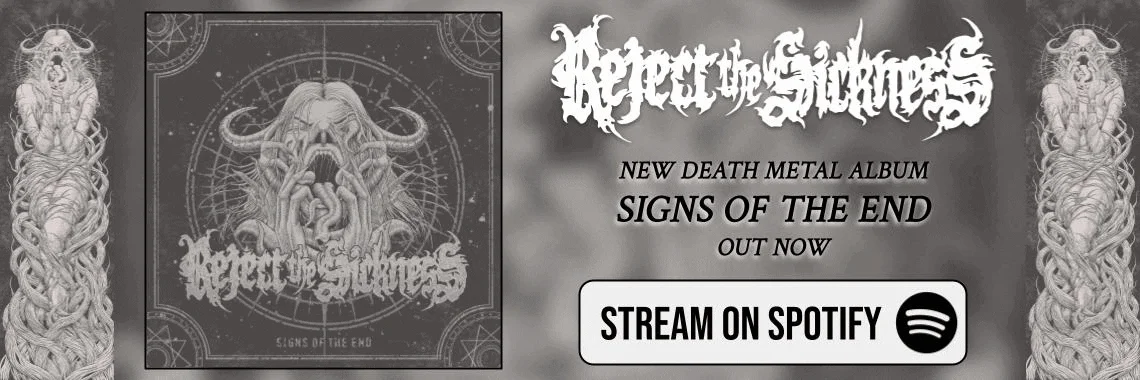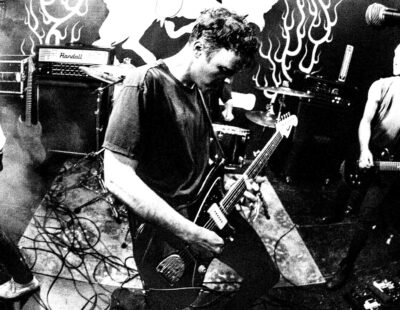T.S.O.L. vocalist, author and provocateur Jack Grisham has visited the land of the extremely extreme several times in the past year or so. He wrote a moving tribute to Jeff Hanneman in our memorial issue last July. In August, he joined the Deciblog for a career-spanning interview where he talked about the classic Dance With Me, his memoir An American Demon and his second life as a writer.
Decibel is now teaming with Mr. Grisham and Punk Hostage Press for an exclusive read of his short story “I Love A Parade,” part of the collection Untamed. There have been some nips and tucks in the second edition, which you can order here.
Grisham just announced the upcoming publication of Code Blue: A Love Story, a book based partially on the T.S.O.L. ode to necrophilia that you all know and love. It will be released in a limited run of 500 copies.
—
On July 4th, Main Street was transformed into a traveling zoo. Great helium animals marched past the windows of his apartment near the corner. He resided on the 4th floor, which gave him a perfect angle to view the beasts of the parade as they passed by. Today was his favorite day of the year. The crowds outside had swelled so that he was almost able to feel their touch—their joy and their Independence Day spirit climbing up toward his heart—almost. When was the last time someone had bothered to come upstairs and knock on his door? The manager of the building had been up some two months ago, but he wasn’t sure if that counted—although, hand delivering a “raise of rent” notice was a very thoughtful gesture. The phone hadn’t rung either. The last call was from his ex-wife’s new “friend” telling him that if he didn’t stop harassing her, a restraining order would be issued. He wasn’t harassing, he just wanted to set things straight, and the fact that she hadn’t called him herself had given him some hope that maybe she still cared enough to continue—of course, that hope was gone now. Their marriage was no better than last year’s streamers—colorful paper ropes, so promising and so beautiful, only to be swept into the gutter and dispatched to the trash.
He looked out the window as a large Sponge Bob floated merrily by. He enjoyed Bob’s cartoons, although he was surprised that the character, traveling down the street, was moving in an orderly fashion; the sponge was, after all, a bit unruly. The thought made him smile.
He’d recently purchased a length of rope and he’d coiled it neatly on the dining room table. It was a strong, thin piece of cut mountain climbing cord—a touch expensive, but worth it, if it didn’t break. He picked up the rope, got down on his knees and wrapped one end around a solid oak leg of the table, and then he tied it off. It left him a length of about thirty-two feet, or the distance across his living room and two stories down; that is, if he was going to toss the rope from the window.
He walked into his bedroom and the pictures from last year’s vacation were still lying on the floor where he’d placed them. He’d laid the photos out as sort of a visual timeline, a map of a trip he’d taken to Big Sur with his ex-wife. He’d been imagining that if he could somehow walk down those frames, navigate the past, that he could bring her home and re-start their life together, but it hadn’t worked. The plan had seemed like it could’ve been successful or at least kind of successful after he’d had a few drinks, but in the morning it was nonsense.
And now, as he contemplated the futility of his existence, he remembered thinking that if he’d kept pictures since childhood—since his first day in the world—that maybe he could have removed a shot or two and been an entirely different man. What were they using to take photos back then, Polaroids? Huh. Even in 1970 they were beginning to lose touch with slow, meaningful, relationships. Everybody wanted fast—instant gratification—nobody wanted to work on anything anymore, really try before you cast something, or someone, aside. Even the parade had gotten quicker. Each year the long, winding, hang-on-to-the-tail-in-front chain had skipped by faster and shorter than before. It was sad.
There was a band going by in the street below. He listened as the sound came close, hung for a verse or two, and then moved on before the chorus. He wondered if the inflatable Sponge enjoyed this tune.
With purpose, he removed his clothes and looked at his reflection in the mirror. He wasn’t a bad looking man. He was tall, what some might consider handsome, and he still had a full head of thick brown hair, but inside he was through. If someone would have poked him, that is, if they had come close enough, his hard outer shell would have easily broken and the thick black gelatinous muck of defeat would have leaked from inside. Shit, he hadn’t thought of that. He hoped he fell clean—without a cut, he’d hate to ruin the parade by raining muck on the spectators.
How’d it go bad anyway, his marriage to Margaret? He’d been kind and gracious, loved her more than anyone ever could. She said he was angry, not at her—well, maybe once or twice at her—but at everything. It wasn’t true. Sure, he had the complaints of any man; why the fuck do they get this and I get that? What have I done to deserve the short end of the stick? Who are they to tell me what to do?
But was he angry? No, he was just tired of being pushed around, and there’s nothing wrong with having a healthy willingness to not be bullied or used by anyone.
He thought back to the day she’d left. He’d come home a touch late as usual, and he was tired, but not overly so. He walked in, the same as he did every night, but this time he walked into the feeling of nothing. She wasn’t there. There was no note; no explanation; no mess; she hardly took anything—some clothes and a photo of the two of them together, but the house had died. It was now the skin of a place that used to be lived in, and looking back, he realized that that small picture had held all the power. It was the heart of their home. A simple silver frame—four inches by six, which cradled a color photo of the two of them smiling and holding hands, and it was gone.
His eyes traveled the house searching for the things that could be removed without him knowing. There were paintings on the walls and knick-knacks on the shelves that he’d never miss. And the TV, crowding the living room, it could be gone for days without his awareness—that is, until he sat down to watch a show. The house was littered with items of no count—all worthless; but that photo, that innocuous little photo—he never even looked at it, but that was the thing he’d missed the minute it was gone. He wondered if the world would miss him, but he didn’t wonder long. He knew the small picture frame spot on the dresser, the one void of dust—Pledge-shiny waxed—held more power and created a deeper sense of loss than anything he would ever be capable of in his life. When he was removed he wouldn’t be missed.
He walked naked into the living room.
He pulled twice on the rope that he’d tied to the table—checked the security of his knot, and then he tied the other end about his neck. As he did so he looked out the window and directly into the eyes of a large pink ape. The wind turned the giant helium head in his direction and the beast’s eyes reflected nothing of him or the room. He had already disappeared as far as this monster was concerned, and if it showed any interest in him at all, it was probably as an apartment hunter looking for a safe place to store its deflated self. He walked to the window and opened it wide.
If it was loud before, it was now a thunderous din—laughter and goodwill rushed up from the street, jumped from the sash, and ran their rude notes across his body. Children screaming—joy-filled voices painfully forcing him to imagine sweet candy-coated smiles and dirty knee’d summer dreams. He closed his eyes and shook the thought from his head.
The rope was a touch rough around his throat so he untied it and went to find something soft to wear beneath. It might clutter the body, lose that dramatic “found nude” headline, but, chafing was chafing, and there was no reason to be uncomfortable.
He returned to his bedroom and noticed that his dresser was as it should be. He paused and listened to a tune from below. It was a parade song, nothing you’d ever listen to in the car, but every time he heard it, he enjoyed it more. Why couldn’t he be ready now, he thought, this would be a great piece to swing to; a real show-stopper, with a nice, tight, beat.
A few of Margaret’s things were left over from her departure, including a scarf that he’d found in the back seat of his car. He’d stowed it in a dresser drawer, the one he was opening now, and there it was, boldly lying across a row of neatly folded T-shirts. The scarf was a light sky-blue with bits of bright yellow and green. It was bright, too bright for this room, although he didn’t remember the colors standing out when she wore it—funny how things change. The scarf still smelled of her. He wondered why perfume stayed on clothes longer than it stayed on skin, and how, even washed, like his button-down grey shirt had been, perfume could stay unfaithfully familiar as it clung to cloth—and maybe, there was that, his infidelity, but he’d never been a one woman man, he’d always needed more—he couldn’t change that. Hell, he took her tears and her monthly moods, why couldn’t she accept him?
Wild horns brayed crazily outside—a gang of clowns was below—reckless, crowding the street, dancing and honking, frightening the children. He pulled the window closed for a second, and as wood touched sill, he shut his eyes and remembered an unpleasant time—a car ride with Margaret that had gone sour. What was she trying to say as he yelled at her—her voice silent—tear-touched lips talking without sound while the horns from the cars behind pushed his rage? She was mute, but the man behind, that fool in the first car—the crying pussy, screaming as he was pulled through his window and beaten down in the street; he was heard. What nerve, telling him to move on, and those others, those horn honking pricks, the ones who hastily reversed their cars as he came toward them, they weren’t silent. And he was sorry, as he climbed back in his car, carrying with him the aggression of the moment. Yes, he’d shoved her. Yes, she hit hard enough to be knocked out, but it was really just a push that had gotten out of control, and if the window and the door jam hadn’t been there to so rudely stop her head, things would’ve been fine.
The clowns moved down the street, and except for the occasional brassy squeal that they’d left behind, they were quickly forgotten. He tied Margaret’s silk scarf around his neck and then gently laid the rope upon it. Ahhhhhh, that was better, and the knot probably had a smarter look, not being laid on bare skin. He coiled the rope in his hand and then climbed up to the window and worked his way into a sitting position on the sill. There he was, feeling the breeze and noticing that bare rumps were not made for rough sills. He dangled his legs over the unknowing crowd. He was in no hurry. When it was his turn to march, he would.
A gentle helium beast rounded the corner—a cartoon bear that he failed to recognize. It took up quite a bit of street as it lumbered and danced in a non-threatening bear-type manner. That was Margaret’s pet name for him—’Bear.’ Yes, bears could be like this one, smiling, toddling giant cuteness down city streets, or, they could be like other bears, like he was sometimes.
He let the rope drop.
It took a clear fall, not tangling itself on any poles or parapets, and then he leaned forward with his hands at his side. He’d let the happy bear have its day, take its turn in the sun, and then he’d jump during the next band.
After a momentary stall—something wasn’t moving on the corner of Main and 12th—the parade rolled on. The gentle bear rambled down the block, and the One-hundred and Eleventh Street School Band came along below his window. They were wonderful—black and purple uniforms, orange plumed feather hats.
He pushed out from the sill.
He was without weight, or worry, for a distance of thirty-two feet and then the rope came to an abrupt end. His head snapped back with a loud, clean pop. He bounced once or twice and then came to rest. Beautiful green and sky-blue colored streamers fell from the roof and hung festively over his body—a perfect match for the scarf.
And as he died his legs twitched in time with the band.






